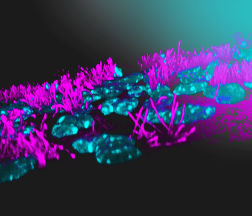Epigenetics (MB150P85) is an advanced course intended for students in the second year of their MS studies and for PhD. students, who wish to engage in a scientific career in the area of cell biology, molecular biology or biomedicine. The course taught in English and is modeled after lectures in MS and PhD. programs at University of Pennsylvania. Emphasis is given on the synthesis of knowledge and problem solving. In its first half, the course covers three main epigenetic mechanisms (histon modifications, DNA methylation and small RNA molecules). In the second half, these mechanisms are integrated in the presentation of important biological processes and models, such as imprinting, dosage compensation (including X-inactivation), epigenetic reprogramming in the life cycle of mammals and stem cell biology. Methods used to study epigenetics, such as chromatin immunoprecipitation, bisulphite sequencing and RNAi are explained in detail.
| 1. | Introduction Overview of the course, basic concepts of epigenetic marks, diversity of epigenetic mechanisms and effects |
| 2. | Histone modification I Concept of chromatin structure. Heterochromatin and euchromatin. Core histones, linker histones, replacement histones, protamines. Methods for studying chromatin. |
| 3. | Histone modification II Histone modifications, polycomb proteins, acetylation, fosforylation and histone methylations, effects on gene expression. |
| 4. | DNA methylation I Molecular basis of DNA methylation. CpG and non-CpG methylation. Adenosin methylation. Metods for studying DNA methylation. Bisulfite sequencing. |
| 5. | DNA methylation II Effects of DNA methylation on gene expression, Methyl-binding proteins and mechanisms of inhibition of gene expression, distribution of DNA methylation within genes and mammalian genomes. |
| 6. | Imprinting Concept of imprinting, mammalian imprinting. Molecular mechanisms of imprinting. Role of imprinting, Battle of the sexes. |
| 7. | X-inactivation Principles and different strategies for dosage compensation. Control of X-inactivation in mammals. |
| 8. | Epigenetic reprogramming in the mammalian life-cycle Integration of epigenetic modification in the mammalian life cycle. Reprogramming of gene expression during development, artificial reprogramming – the traditional view. |
| 9. | Epigenetic mechanisms found in other model systems (plants, yeasts, invertebrates …) Selected epigenetic mechanisms controlling genome integrity and gene expression |
| 10. | RNA silencing I – molecular machines for RNA silencing A historical introduction into RNA silencing. Post-transcriptional effects. Roles and effects of dsRNA. Proteins and complexes in RNA silencing. |
| 11. | RNA silencing II – RNAi technology Experimental and therapeutic use. Design of RNAi experiments |
| 12. | RNA silencing III – roles of RNA silencing pathways miRNA pathway, chromatin connection. |
| 13. | Integrated view of regulation of gene expression Establishment and maintenance of pluripotency in ES cells and embryos |
The annual lecture course organized by the Institute of Molecular Genetics of the Czech Academy of Sciences and the Center for PhD programs in biomedicine at Charles University and Academy of Sciences of the Czech Republic.The course is primarily intended for PhD students in biomedicine. The course is based on a series of lectures by selected experts who present information about the scientific advances in the interdisciplinary field of molecular biology, genetics and biomedicine with some biotechnology insights.
For more information see the course website – https://pokroky.img.cas.cz.




